More than 50 years ago, Susan Sontag’s essay Against Interpretation became one of her most famous and widely scrutinized writings. Sontag wrote in the last line of the essay, “In place of a hermeneutics we need an erotics of art,” – a declaration that resonated in her deep admiration for Franz Kafka’s work and, in particular, his short story A Hunger Artist.
Some criticized Sontag for a missed opportunity. “Her opposition to interpretation locked criticism into a self-abnegating passivity, abstemiousness, and austerity,” Richard Brody wrote in The New Yorker regarding her distaste for classifying great Hollywood films in the same breath as outstanding works of art or classical music. At her Brain Pickings website, Maria Popova suggested a better title for Sontag’s essay would have been ‘Against An Interpretation [her emphasis].’
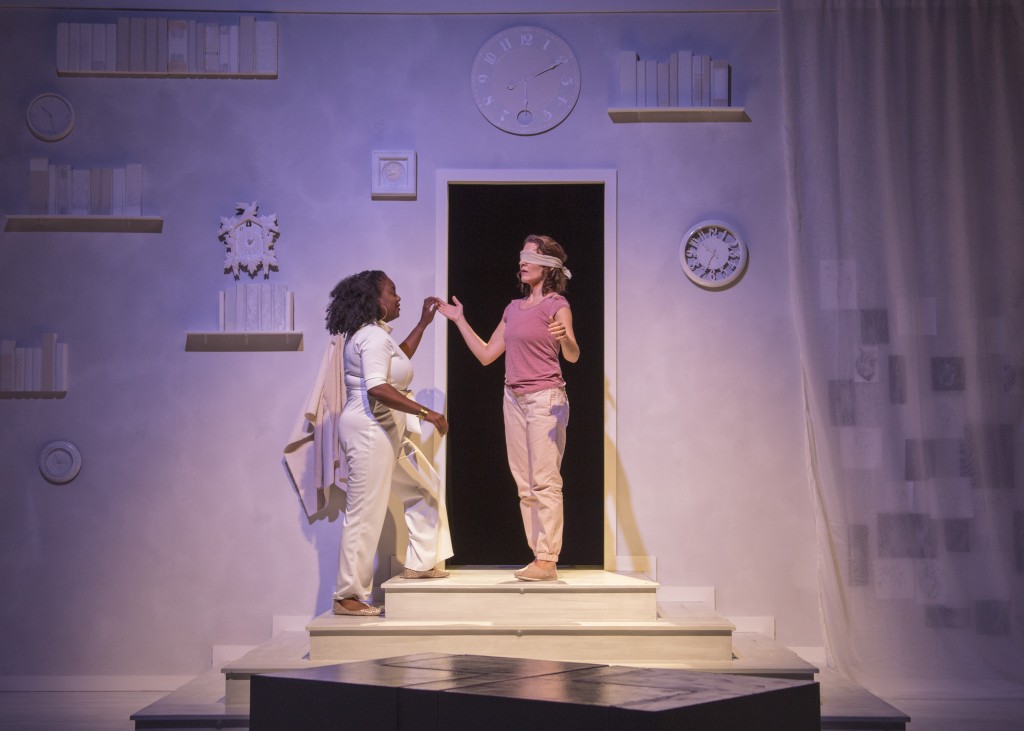
Emphasizing multiple interpretations as a practice of “psychological hygiene” to counter the “artificial authority” of our inner demons and tyrants, Popova suggests an essay by Adam Phillips titled Against Self-Criticism as a better alternative to Sontag’s work. The essay is included in Phillips’ collection titled Unforbidden Pleasures (Penguin Books, UK, 2016). Phillips writes,
How has it come about that we are so bewitched by our self-hatred, so impressed and credulous in the face of our self-criticism, as unimaginative as it usually is? And why is it akin to a judgement without a jury? … Self-criticism, when it isn’t useful in the way any self-correcting approach can be, is self-hypnosis. It is judgement as spell, or curse, not as conversation; it is an order, not a negotiation; it is dogma, not overinterpretation.
To wit, these questions lead to many worthy interpretations of The Weird Play, a marvelously apt title for Jenifer Nii’s newest theatrical work, now being presented in a sold-out run in a collaborative production by Salt Lake City’s two most original theatrical companies – Plan-B Theatre and Sackerson.
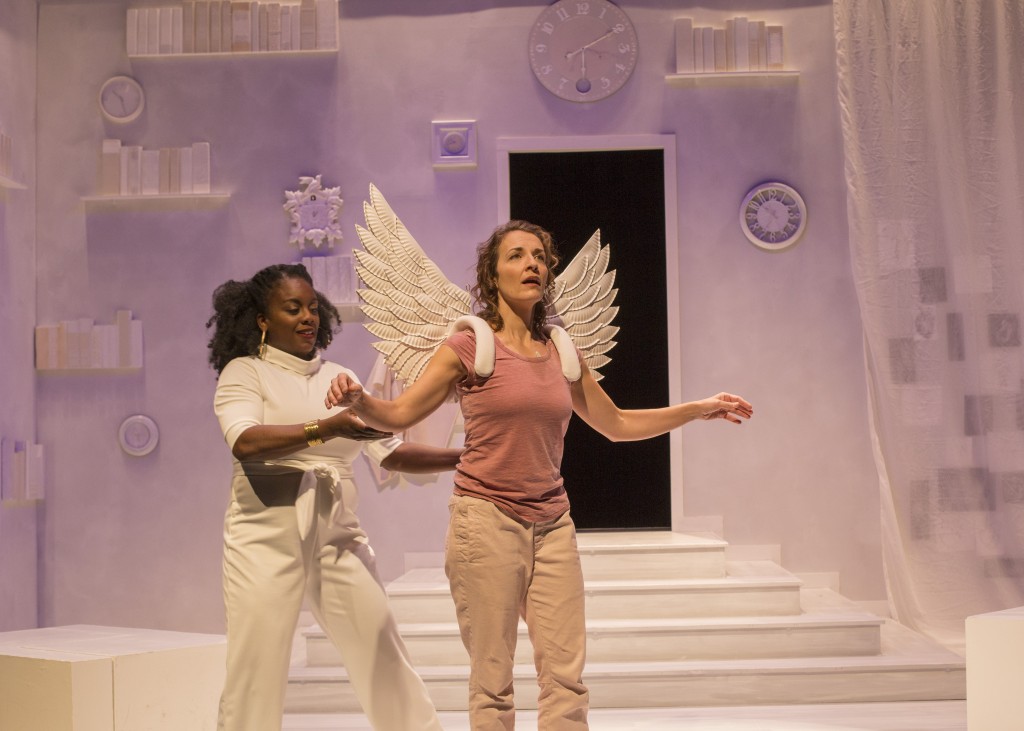
The play, one of the most liberating creative statements that has been seen in any Utah theatrical production, is about revealing ways of love that ultimately heal and fulfill ourselves in unanticipated ways. It is love conceived well beyond the safe conventions of storytelling where its romantic or spiritual form often exclusively girds the drama. In an astonishing script that runs just 70 minutes and synthesizes practically every Aristotelian and Platonic aspect of love, Nii’s story of three characters traverses the territory from erotic love to deep friendship to familial love and to casual love, hubris, self-esteem, religious devotion and secular duty, and to the difficult-to-attain ideals of agape. It never lingers long enough to cement one specific thematic interpretation.
Nii masterfully integrates these aspects in a rendition that strongly encourages audiences to find and make their own interpretations. Indeed, various interpretations are equally credible, as observed on opening night. Upon seeing the set (designed by Halee Rasmussen), some observers, for instance, remarked that it reminded them of celestial rooms in Mormon temples. There are shelves, clocks (15 on the walls), books and movable blocks. The set’s blinding sanitized appearance of white modulates as the show proceeds, as changes in lighting and hues liven the space that complement the tone and tenor of a scene. There is a curious, fresh cinematic ambience about the whole production, directed by Alex Ungerman, who honors every bit of Nii’s detailed instructions in the script.
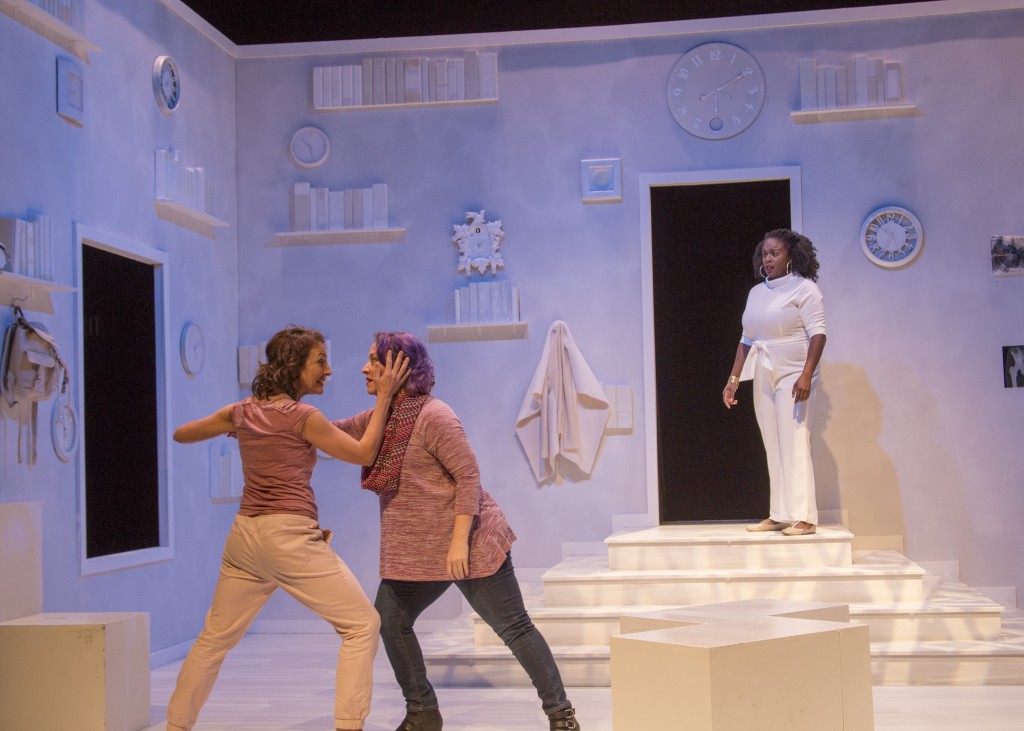
And, some audience members as they exited the Studio Theatre in the Rose Wagner Center for Performing Arts, could be heard, expressing enthusiastically their own interpretations. One couple saw the play rich in religious allegory, a plausible interpretation. There are two moments in the play when characters utter the phrase, “Pseudologia fantastica!,” defined as compulsive lying to create a convincing new identity. The first instance occurs when One (Susanna Florence) asks Two (Dee-Dee Darby-Duffin) to “tell me the truth.” Two responds grandly with the phrase (“Pseudologia fantastica!”). This perplexes One, who says “What?” and then Two responds, “Truth.” Later, it is One who utters the same phrase to Three (April Fossen).
One’s interpretation of The Weird Play could be influenced or framed in ways that all seem apparently acceptable to Nii, depending upon an individual’s age, perspective of cultural reference, or experience with any form of love represented in the stage action. In the immersive age of social media and digital communication, for example, people might see the characters akin to those who habitually mask their identities online. The available technology has inspired many creative ways to support and buttress the experience of ‘Pseudologia fantastica!’ And, this is not limited to our interpersonal relationships. The tribal love, devotion and adoration of religious, political, cultural, ethnic and sociological identities are played out in equal intensity.
There are many reasons why people craft different identities – to cover shame, discomfort or embarrassment about physical or emotional problems or their sexual identities. Some might do it for revenge or plain malice. Some do it because fantasy allows them to endure the numbness of daily ennui. But, many also do it because they believe they have found the person, ideal, entity or institution to whom they can trust their heart and full-blooded devotion, especially if they have yet to meet the person in real time. Sometimes it’s romantic but it also encompasses religious, spiritual, political, and ideological dimensions.
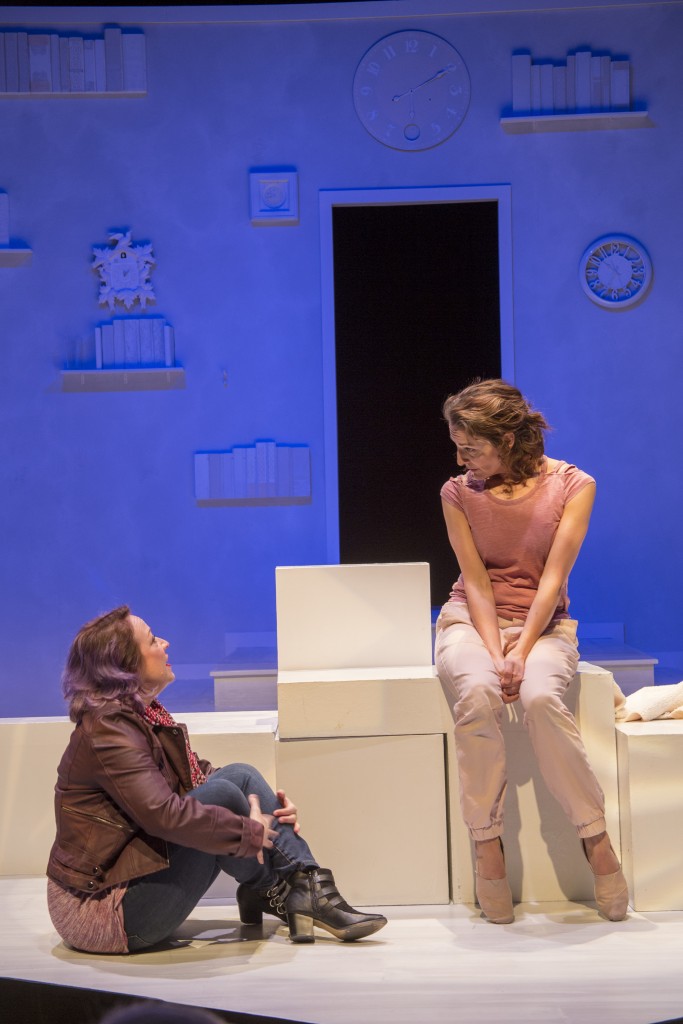
And, as One discovers, it can be disarming to find that there have been “others” when it comes to affection and devotion. When Two places One’s image above the rest on her wall, One is surprised to see so many others who have preceded her. As One picks them off the wall individually, Two runs through the litany of what they represented and why they failed: thief, blasphemer, greedy, disloyal, irritable, inconstant, lazy, faithless, feckless, adulterous and murderous.
Nii encapsulates each of these emotional response in lucid, compact form. In one scene, as Two repeats in a steady cadence the phrase, “choose me,” One empties a bag on stage, removing items individually. They include a holy book, vibrator, syringe, liquor bottle and hand mirror. Two silently repacks the items in One’s bag and looks sadly at One, who attempts to take back the bag but Two moves her hands away and the bag is placed on her shoulder. The angelic wings have retreated, also a burden that Three later says “is heavier than I thought.”
Sometimes, the characters seem mystified and in other moments, there is hostility. At Three’s first appearance, Two says, as she pushes Three into a corner, “Three’s a crowd, and we can’t be everywhere at once, can we? We must focus. We must focus and here we are shiny with focus and gleaming at the sights ahead. You are three. You can wait your turn.” Two sees Three as a burglar, interrupter: “It knows the code! How does it know the code?”
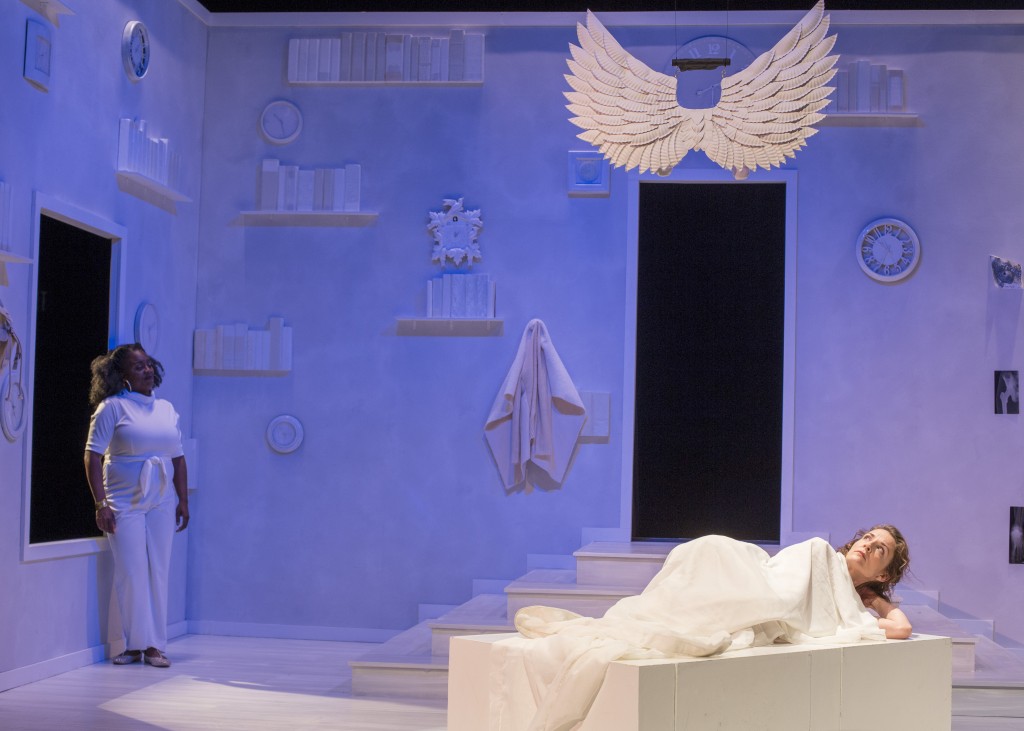
And, finally, in distinct ways, each of the characters – One, Two and Three – seem profoundly sad. All three actors in The Weird Play convey the panoply of emotions that respects the integrity of Nii’s script. Florence’s emotional trajectory is poignant and she shapes her character so skillfully as she confronts the embittered sensations of jadedness and cynicism that temper and darken an earlier exuberance. Likewise, Darby-Duffin tempers adroitly the initial goddess aura of confidence with her own embittered expressions of disappointment and vulnerability. While a good portion of the play focuses on One and Two, Three’s appearances incorporate some of Nii’s finest words that emphasize each’s character’s complexities. Fossen is eloquently understated in her best moments, such as when she tells One, “There are hidden paths, freshly pressed with the heart prints of heroes and thieves. I look for them.”
Perhaps the weirdest thing about The Weird Play is how everyone involved with the production makes the most generous gestures in ceding the role as sovereign interpreter to the audience. While the premiere cast is all women, Nii says the play’s gender makeup can be flexed accordingly for future productions. Conceived in Utah, the play translates smoothly to other communities and regions potentially reaching audiences of all types of demographics across the country. The Weird Play was one of 10 plays in the U.S. to receive a Writers Alliance Grant from the Dramatists Guild Foundation.
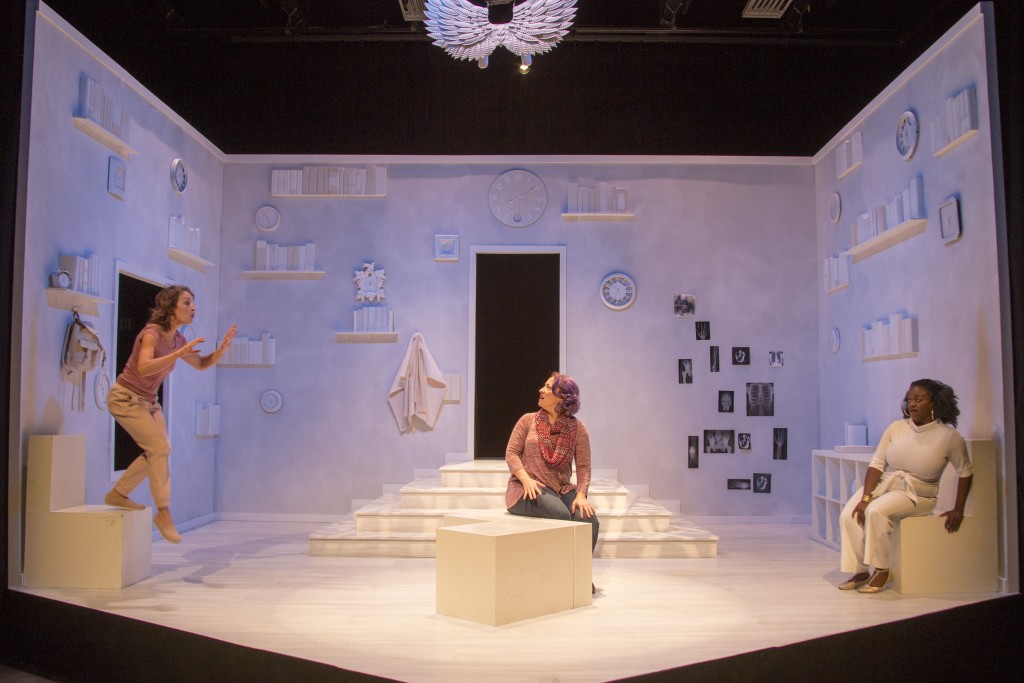
We should never fear speaking of our own pleasures, loves and passions because of the opportunities for love that we might miss. Nii says writing the play liberated her imagination in many directions, including the capacity to express her own love for theater, a creative calling that she only answered earnestly in the last decade. Likewise, The Weird Play presents equally worthy opportunities to the audience.
The production includes the usual first-rate crew: Jennifer Freed as stage manager, Cheryl Cluff on sound, Jaron Hermansen on lighting, Phillip R. Lowe on costumes, Arika Schockmel on props and Aaron Swenson on artwork.
The run is sold out but wait lists for tickets are available for the five remaining shows, presented in the Studio Theatre of the Rose Wagner Center for Performing Arts. See Plan-B’s website for more details.

